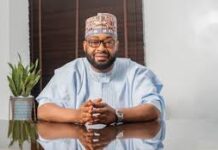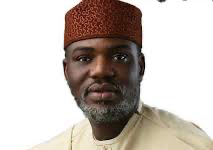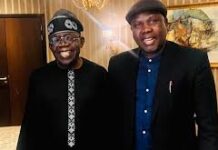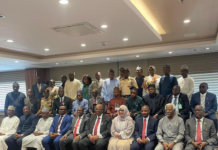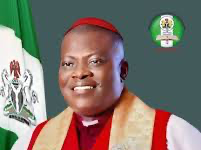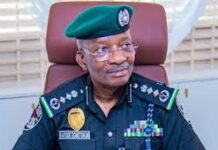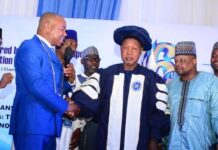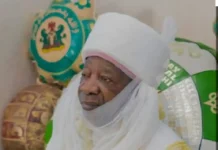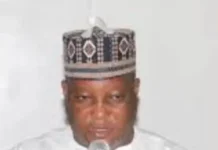What Is Choking Nigeria’s Democracy?
Thaddeaus Thompson
POLITICS DIGEST – The major problem democracy faces in Nigeria is rejection. Nigeria was introduced to democracy on the day of independence and not in 2021.
Democracy was seen by our founding fathers as a direct foreign intrusion and a deliberate attempt by foreign powers to destroy our totalitarian anarchistic systems. Instead of democracy, most African countries embraced the socio-communist model of governing, after independence.
This was the comfortable and preferred model as it preserves anarchy and kingship, which most African leaders saw befitting to their firm belief in dominance. When mounting pressure from the western world mandated African countries to embrace and practice western style of democracy or forgo economic aid and face isolation and deprivation, most African autocrats succumbed but not for the sake of promoting unity, security, nor providing reliable health care, education, and critical development of legacy projects. Rather, they adopted the 4-8 tenure (4-8-year voting system) and named it democracy.
Just because a country goes to the ballot box every 4 years does not mean it is democratic. Democracy puts human rights as a priority, and as such Nigeria must focus on improving its human rights record; it is what qualifies a country as democratic.
A country with a 4-year voting system but has no respect for human rights is not democratic. Human rights include promoting unity by action and not just by empty decrees. Human rights ensure security and safety for the masses; human rights entails providing quality, affordable, and accessible healthcare for the masses; human rights mandates the provision of quality and sound education to the masses, and an evened-out critical development in infrastructure across the country and not just a few cities.
The founders of democracy understood the quintessential of building legacy rather than just being a pass-through administration. Unfortunately, there is not much good to write about a non-existent Nigerian democracy. Freedom of speech may score a pass mark in Nigeria but having a system that has immunized itself against critics makes any attempt to use critics as checks and balances obsolete.
Nigeria’s democracy has also suffered immensely from excessive criticism of leaders by the press and opposing political parties. No administration can perform without mistakes; however, a total disrespect of the country’s leadership for any apparent reason has backfired and not necessarily achieved the highly anticipated checks and balances.
Just wait for the next administration and the opposition will continue the vicious cycle. Unity is badly needed to birth democracy in Nigeria. Anybody thinking democracy could be achieved without unifying behind the winner is wishful- thinking.
Read Also:
Except democracy is taken literally for its definition, “a system of government by the whole population or all the eligible members of a state, typically through elected representatives,” it will not score a pass mark in every country the definition fits, which will include Nigeria.
However, the expectations, such as hopes and aspirations a successful democracy exhibits have fallen short in Nigeria. Those in power may disagree with the populace on the interpretation of democracy and maybe right if we are to consider the definition of a democratic country, as stated earlier.
Whoever crafted the definition did not think of evolution; that is, a period in which people will expect more to the meaning of democracy than merely having an electoral system. If elected officials could see their career as service to the people rather than an investment that must yield huge monetary rewards, the hope of initiating democracy can be established. Such a move must reflect the voice of the people who voted them in, which often is the demand for basic amenities.
What can also improve Nigeria’s democratic system is purging the old guard and bringing in fresh-blood politicians because it’s their future. This is not to take away the traditional values which depict the young should respect their elders.
Nigeria needs a president that is not older than 50 years; is sophisticated, attuned to modern business concepts, technology, and development, and believes in inclusion, particularly young University graduates. Nigeria’s democracy is also affected by a society that has for decades honored criminals and oppressors.
Adjustments in these areas are key components that could help foster democracy. The government is not the only area to blame for Nigeria’s failed democracy; a culture of “duping and 419” has been allowed to gain firm grounds for too long. Nigerians should openly condemn criminality, particularly within its leadership, in order to build back the nation’s reputation and boost investor confidence.
There has not been a single administration that stood against corruption in Nigeria, whereby the population was educated on the consequences of being portrayed as one of the most corrupt nations on earth. It should not be a surprise that after 60 years of Independence, a handful of elected officials have had the courage to weep over the destructive nature of corruption in the country.
Democratic values cannot thrive on corruption. Nigerians must stop living in denial that we have a very serious corruption pandemic that makes it impossible to enjoy the fruits of democracy. Capitalism and democracy are ascendant in the third world. It takes one single inspirational leader to bring democracy to a nation.
Dr Thaddeaus Thompson is a public and economic affairs analyst, wrote in from California, United States of America, U.S.A.






